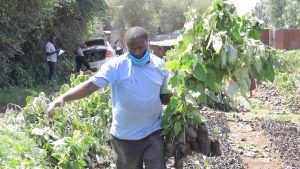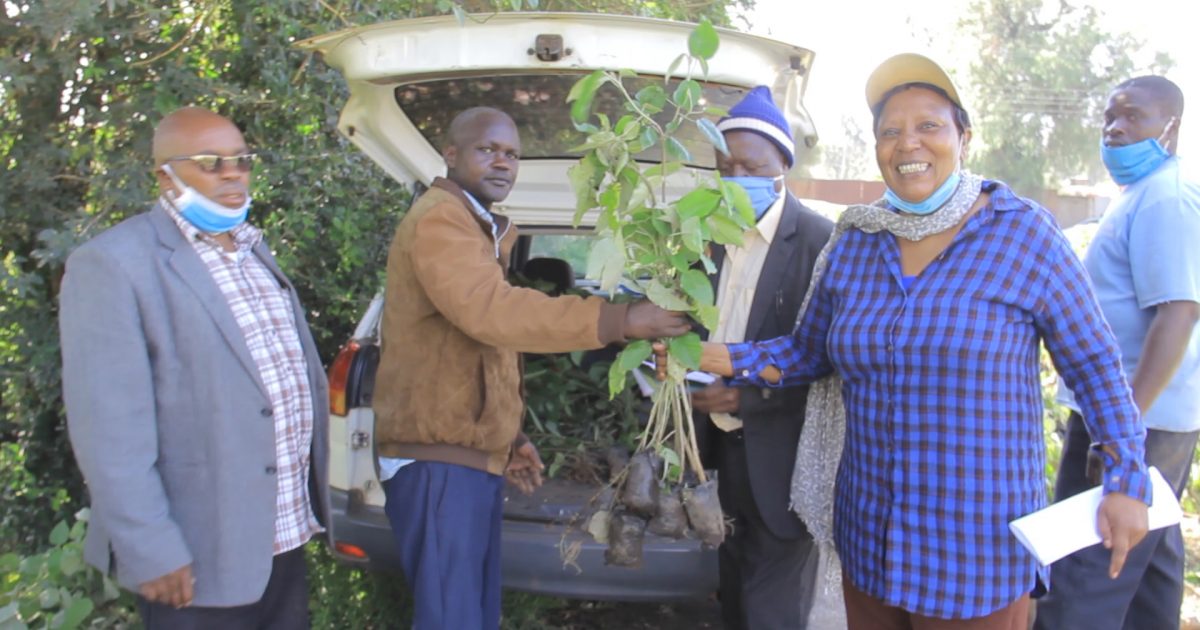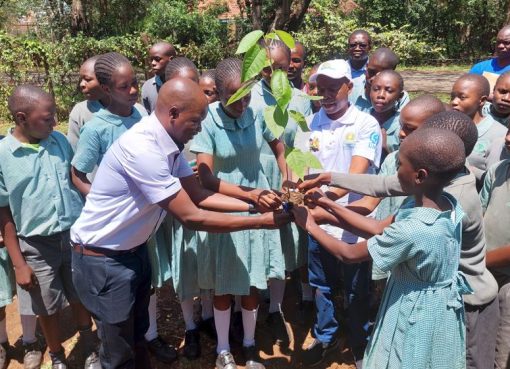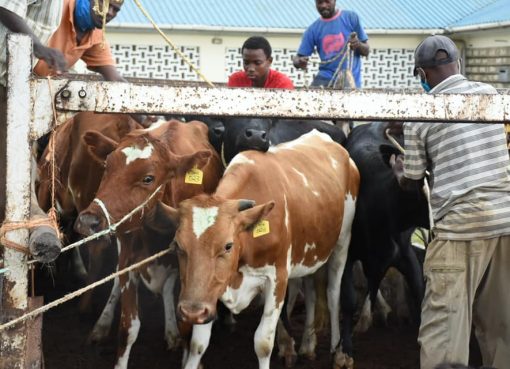
Although it is viewed to be of little use other than for firewood or shade, Croton megalocarpus is now being touted as a tree with a huge potential to reclaim eroded soils and restore them to productivity besides being an excellent source of biofuel.
An environmental conservation lobby Multi-touch International is now promoting the planting of the tree called Msenefu in Kiswahili, Mukinduri in Gikuyu and Kelelwet in Kipsigis on deforested slopes that have been washed away by rain water from the highlands, rendering the once fertile farmlands in Nakuru County into wasteland.
The lobby’s Executive Director, Christine Wangare said the organization had distributed over 120,000 croton seedlings to more than 40 villages spread across the eleven Sub-Counties to reclaim farmlands with steep slopes, huge gullies and unfertile soils.
Ms. Wangari observed that the landscape in most parts of Nakuru had allowed rain water to always flow down to valleys in large quantities and as a result, a lot of fertile soil has been washed away posing a major food security challenge in the county.
“Over the last three years, we have rehabilitated bare land by planting croton trees and supporting growth of naturally occurring vegetation,” she said.
“Huge swathes of forest land were cleared in Molo, parts of Kuresoi and Subukia Sub-Counties leading to soil degradation. Croton is a drought-resistant tree that can survive in harsh climatic conditions and is a good wind breaker, hence its popularity on farm boundaries,” said Ms. Wangare.
She said Croton nut is traditionally underused despite the rapid growing market demand in East Africa for its products like biofuel, animal feeds and fertilizer.
Towards reversing the trend, her organization has distributed a further 150,000 seedlings to 500 schools within Nakuru in a move aimed at enabling learning institutions and the younger generation to learn and embrace value addition chain of the croton seed nut.
“We still have 310,000 croton seedlings in our nurseries which we are distributing to farmers free of charge. Increasingly, croton nuts are being used as a source of biofuel, fertilizer and animal feed. This is where we want schools in the long term to exploit croton megalocarpus’ potential to transform their financial fortunes,” stated Ms. Wangare.
Following initiation of the project, locals dig terraces on sloppy ground that have aided in curbing soil erosion, managing to rehabilitate tens of acres of land that were totally unproductive to grasslands. The land now provides pasture for their animals and is also a source of income.
Ms. Wangare pointed out that leaves from the trees and shrubs have greatly improved the fertility and soil texture in the regions while providing cover that helps in reducing evaporation during the rainy season.
She said mature crotons produced clusters of bright sweetly-scented flowers which attract bees making the tree crucial in honey production.
“It is an eco-friendly way of engaging in economic activities where the community invests in nature conservation then waits for the fruits that come with it,” she noted.
“Beekeeping is now a nature-based enterprise enticing thousands of small-scale farmers diversifying to the rewarding apiculture in many parts of Nakuru,” said the executive director.
Croton megalocarpus grows naturally in various ecological zones — from the Coast to the highlands of central Kenya and the dry lands of the North Rift.
Ms. Wangare observed that private entities involved in bio-fuel manufacture buy croton seeds at Sh10, 000 a tonne.
When the oil is extracted, she explained, what remains is used as animal feed adding that Croton seed has high oil (30 per cent) and protein (50 per cent) content.
The husks, which are rich in nitrogen, are used to make organic fertilizer. Leaves are also used as mulch because of their high nitrogen content. The oil is used in machines and in tanneries to treat leather.
The Multi-Touch Executive Director observed that soil degradation had been so severe in parts of the devolved unit that dairy cows were yielding less than 5 litres of milk per animal per day, maize production had dropped to less than 15 bags an acre, potato yields had dipped to the lowest 50 bags an acre while local chicken were laying an average of 60 eggs per bird per year.
When planted in single lines along the contour, croton is very effective in soil and moisture conservation. Apart from controlling soil erosion, the drought-resistant tree’s bark, seeds, roots and leaves are traditionally used to treat stomach ailments, malaria, wound clotting and pneumonia.
Mary Otwori, a teacher at Molo Academy Primary School, said the institution had planted 300 Croton seedlings terming it as multi-branched hence it is very ideal for firewood “as you do not have to cut down the tree, you just prune the branches”.
She said the effects of climate change were reducing Kenya’s agricultural production, increasing intra- and inter-community conflicts over resources (especially water and pasture) and triggering migrations which, again, inevitably breed conflict.
“We must plant more indigenous trees. Reducing pasture and erratic rainfall patterns have created farmer-pastoralist conflicts which, unchecked, have escalated to full-scale bloody violence.
Migration of agricultural communities closer to the river sources and over-exploitation of the little water available (or remaining), threatens downstream communities, which rely on the rivers for pasture and domestic use,” stated Ms Otwori.
The Principal to Gichobo Secondary School within Njoro Sub-County, Ms. Nisiaye Masikonte said there was urgent need to bring back and amplify the tree planting culture in homes, schools and other public institutions.
“We must inculcate a culture of environmental consciousness in especially our growing children, who face even greater threats from changing climate.
Ms. Masikonte whose school also received 300 croton seedlings from Multi-Touch International suggested that national and county governments create incentives for climate-smart interventions such as setting aside funds and special grants for environmental conservation and restoration.
By Anne Mwale/Dennis Rasto





